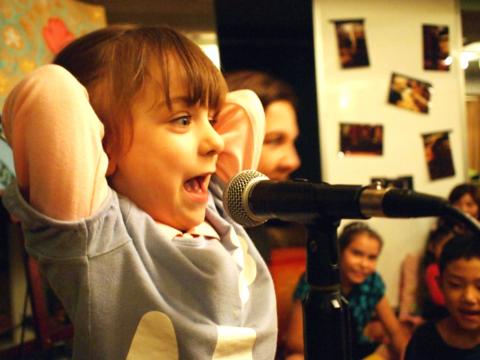In an era where smartphones dominate the lives of Generation Z, the Red Room Group, a Taipei-based non-profit which strives to bring the English-speaking community together through organizing Thespian, salon-like events, is making the arcane concept of show-and-tell cool again.
One and a half years ago, Red Room joined forces with the Taipei City Playgroup, an English-language parenting-social group founded by Jennifer Chau (曹珍妮), to establish Stage Time and Juice. The concept behind it is similar to Red Room’s original Stage Time and Wine where adults huddle and drink wine while listening to poetry recitations and prosaic prose. Held every third Saturday of every other month, Stage Time and Juice invites children up to the stage to sing a song, tell a joke or share a story. And, of course, the wine is replaced with juice, since this is a family event.
ENCOURAGING ENVIRONMENT

Photo courtesy of Brian Webb
Seeing as the weather has been unusually warm lately, tomorrow’s theme is Jumping into Spring. Carol Yao (姚可樂), the event organizer, says that they try to draw inspiration from the time of year. For St Patrick’s Day last year, they had the children prepare a limerick in exchange for a cupcake, and during Dragon Boat Festival, the theme was Drums, Dragons and Drowned Poets.
As these themes suggest, performances are meant to be as fun-spirited and free-flowing as possible.
“We allow the kids to go up on stage and try out anything that compels them. Once we even had a young gymnast do a few handsprings across the carpet,” Yao says.
Although some of the children are mortified by the thought of taking the stage, their peers and the emcee are very encouraging. A perfect performance is not necessary. The children are allowed to start over and take their time to feel comfortable, as the audience cheers them on. To keep it lively, at least one interactive activity such as riddles and guessing games is organized at each gathering.
“We try to make it feel like we are a family,” Yao says. “This is completely different from any performance they would be asked to do in an academic setting or competition.”
EXPANDING HORIZONS
Although Stage Time and Juice may appear to be fun and games, the ultimate goal is personal growth and development.
However, it’s not just about helping the children with cultivating confidence and becoming more outgoing. “It is also for the parents who may have found themselves exhausted from years of worrying about their kids,” Yao says.
“The hope is that the parents, many of whom happen to be teachers, will also understand that this is a chance to explore working with an audience, and that they will come out and experiment as well,” she adds.
Yao says that she has noticed positive changes in her own two children who have been performing regularly.
As for the future direction of Red Room, the group’s coordinator Roma Mehta says that through collaboration with various other organizations in Taipei, “we are striving towards a larger reach and a more interactive arts scene.”
Red Room has already held a Stage Time and Wine in New York City’s Upper East Side earlier this year, as well as one in Calcutta in 2013.
Tomorrow’s Stage Time and Juice will take place at the Red Room in Daan District (大安) at 2pm. Participants are encouraged to bring juice and snacks to share, as well as fluffy pillows since only floor seating is provided.

On April 26, The Lancet published a letter from two doctors at Taichung-based China Medical University Hospital (CMUH) warning that “Taiwan’s Health Care System is on the Brink of Collapse.” The authors said that “Years of policy inaction and mismanagement of resources have led to the National Health Insurance system operating under unsustainable conditions.” The pushback was immediate. Errors in the paper were quickly identified and publicized, to discredit the authors (the hospital apologized). CNA reported that CMUH said the letter described Taiwan in 2021 as having 62 nurses per 10,000 people, when the correct number was 78 nurses per 10,000

As we live longer, our risk of cognitive impairment is increasing. How can we delay the onset of symptoms? Do we have to give up every indulgence or can small changes make a difference? We asked neurologists for tips on how to keep our brains healthy for life. TAKE CARE OF YOUR HEALTH “All of the sensible things that apply to bodily health apply to brain health,” says Suzanne O’Sullivan, a consultant in neurology at the National Hospital for Neurology and Neurosurgery in London, and the author of The Age of Diagnosis. “When you’re 20, you can get away with absolute

May 5 to May 11 What started out as friction between Taiwanese students at Taichung First High School and a Japanese head cook escalated dramatically over the first two weeks of May 1927. It began on April 30 when the cook’s wife knew that lotus starch used in that night’s dinner had rat feces in it, but failed to inform staff until the meal was already prepared. The students believed that her silence was intentional, and filed a complaint. The school’s Japanese administrators sided with the cook’s family, dismissing the students as troublemakers and clamping down on their freedoms — with

As Donald Trump’s executive order in March led to the shuttering of Voice of America (VOA) — the global broadcaster whose roots date back to the fight against Nazi propaganda — he quickly attracted support from figures not used to aligning themselves with any US administration. Trump had ordered the US Agency for Global Media, the federal agency that funds VOA and other groups promoting independent journalism overseas, to be “eliminated to the maximum extent consistent with applicable law.” The decision suddenly halted programming in 49 languages to more than 425 million people. In Moscow, Margarita Simonyan, the hardline editor-in-chief of the